- Home
- Sue Grafton
Y Is for Yesterday Page 3
Y Is for Yesterday Read online
Page 3
The article gave a summary of the events that had taken place ten years before, when Fritz McCabe had been the shooter in the killing of a teenaged girl named Sloan Stevens. Both were enrolled at Climping Academy, the fancy private college-prep high school in Horton Ravine. In a highly publicized cheating scandal, two students were given a stolen copy of the California Academic Proficiency Test and used the answers in hopes of improving their scores. The Stevens girl knew about it and she was alleged to have sent a note to the school administrators naming the two—Troy Rademaker and Poppy Earl—who were subsequently suspended. As a consequence, Sloan Stevens, the purported informant, had been shunned by her fellow students.
Thereafter, a feud developed between the Stevens girl and another classmate named Austin Brown, whom she believed had instigated the social ostracism. At a party to celebrate the end of the school year, tensions had boiled over and Brown was alleged to have ordered her to be forcibly removed to an isolated area where she was subsequently killed. Brown was also identified as the person who had supplied Fritz McCabe with the weapon used in her shooting death. Of the four boys implicated, one testified at the trial in exchange for immunity from prosecution. Fritz McCabe was found guilty of murder one, kidnapping, and tampering with evidence. He was given the maximum sentence, serving his time at CYA until his twenty-fifth birthday, when his release was required by statute. Troy Rademaker had been found guilty of obstruction of justice, tampering with evidence, aiding and abetting, and lying to the police. Austin Brown, who was alleged to have engineered the killing, had fled and was still at large.
Diana had included a couple of quotes from Fritz, who said, “I’ve paid my debt to society. I made a mistake, but I’ve put that behind me now so I can move on.” When asked about his plans, he said, “I’m looking forward to time with my family and then I hope to find a job and become a worthwhile member of the community.”
I took a wild-ass guess that Lauren McCabe’s call was related to her son’s release from prison. Much to ponder here and I was already curious what sort of task she had in mind.
I went up the spiral stairs to the loft, changed from my work clothes into sweats, and hit the walkway that parallels the beach. The running path is shared by walkers, bikers, and kids with skateboards. It was also sprinkled with city signs advising us to share and play nice. The sky was a wide expanse of unbroken blue with not a cloud in sight and it felt good to be in the open air. I didn’t like having to adjust my exercise routine to account for Ned Lowe, but neither did I like the feeling of vulnerability. I would have preferred to run packing my semiautomatic, but that seemed extreme. Last I heard, Ned Lowe had torched his motor home in the desert and was believed to have taken off on foot. In the wake of his disappearance, his photographic darkroom had yielded numerous pictures of the young girls he’d killed.
I finished the jog with a walk to cool down, and then showered when I got home. I spent the next couple of hours reading a mystery novel by Elmore Leonard, marveling as I always did at his ear for low-life dialogue.
At six, I set my book aside and headed for Rosie’s, which is the Hungarian dive half a block from my apartment. I’m there three or four nights a week, which is embarrassing to admit, but true nonetheless. I don’t cook, so if eating is on my mind, my options are limited.
Walking in, I saw no sign of Henry’s brother, William, who’d been felled by a twenty-four-hour stomach flu that had confined him to his bed for the previous five days. He and Rosie had been married for three years and he was usually front and center, tending bar and chatting up the customers while she commandeered the kitchen and bullied diners into ordering what she referred to as the Special du Jour of the Day.
Rosie was at the bar rolling stainless-steel flatware into paper napkins. I spotted my friend Ruthie at a table by herself and she waved, gesturing for me to join her. I held up a finger, indicating a slight delay during which I caught Rosie’s eye. “How’s William doing?”
“Still chucking up one end and sicking out the other.”
I held up a hand, blocking the mental images. William was ninety and I didn’t want to hear the details about his bodily woes.
During the late summer months, we’d all been subject to one illness after another: colds, flu, bronchitis, pharyngitis, laryngitis, sinusitis, pleurisy, and otitis media. William, already inclined toward hypochondria, was elated, seeing in our ailments a pointed reminder of our own mortality, which he believed was imminent. The rest of us were not convinced. When our low-grade fevers and hacking coughs went on too long, we cycled through a nearby Doc-in-a-Box and came away with short-term courses of antibiotics, which made us right with the world. Rosie ignored our penchant for pill popping and refused medical intervention altogether. She believed sherry was the cure for just about anything, including galloping pneumonia. Since she alone of the gang had been unaffected, I was inclined to take her word for it. “You like wine?” she asked.
“Why not?” I said. Rosie’s wine had all the germ-killing properties of a popular mouthwash.
I joined Ruthie, whose attention was fixed on my cousin Anna, who was sitting with Cheney Phillips, a homicide detective with the STPD. The two had their heads bent together over a crossword puzzle. Anna looked fetching for someone who puts her outfits together with a careless disregard for fashion trends. She wore baggy cargo pants, an oversize bulky-knit gray sweater with a white T-shirt under it, and what looked like combat boots. Her hair was pulled up on top of her head, where she’d secured the bun with a pair of wooden knitting needles. Cheney sat next to her in a chair he’d pulled around parallel to hers. He had his hand on the back of her seat, his legs stretched out in front of him.
“They seem as comfortable together as an old married couple,” Ruthie remarked. “Pity you didn’t snag him when you had the chance.”
Ruthie was the widow of a private detective named Pete Wolinsky, who’d been shot to death a year prior, leaving behind work notes that had led me to Ned Lowe, he of the girl-choking inclinations. She was referring to the fact that I’d had a fling with Cheney two years before, and while nothing had come of it, I’d since experienced a proprietary sense that my cousin was out of line. I’d never confided the particulars of the affair, but Anna should have known enough to keep her hands to herself. I wasn’t exactly miffed, since the pairing wasn’t a surprise as those things go. Anna was a guy magnet. Who could resist her when she was so pretty and with such a welcoming air about her? Also knockers twice the size of mine. Some would call her “loose,” but let’s not get into that. Even with my natural bias in place, I could see her appeal. She was open and unpretentious and it was clear she liked guys. No hidden agenda here, more’s the pity in my view. I would have preferred her with a load of unassigned rage so that men who fell under her spell would soon realize she left something to be desired. Apparently, not so in Cheney’s case.
“She can have him,” I said.
“Yeah, right,” Ruthie replied with a rolling of her eyes.
“I’m serious.”
“I’m not arguing. I’m expressing skepticism.”
I was aware that the place was filling up with off-duty police officers. The STPD had settled into Rosie’s like a flock of homing pigeons when the Caliente Café, their former roost, had closed following a kitchen fire. Rosie’s had previously been the home to a crew of sports rowdies, who jammed the place for the Super Bowl and countless other sporting events. Their softball trophies were still in evidence, along with a jock strap someone had flung over the stuffed marlin Rosie’d hung above the bar. These migratory rowdies had moved on, as though in response to the changing seasons. Off-duty officers were a breath of fresh air by comparison, as their shoptalk centered on crime. This dovetailed with my interests and meant there was always someone willing to kvetch about robbery, murder, assault, and displays of public drunkenness.
Rosie brought Ruthie a martini straight up and brought me
a glass of white wine, freshly poured from a one-gallon jug she kept on a shelf out of sight. This was so her patrons couldn’t see the label on the cheap brand she bought. One taste was all it took to identify the wine as swill, but none of us had the nerve to bitch. Rosie was a bit of a bully when it came to her place. She told you what to eat, which was inevitably a strange Hungarian dish replete with offal and sour cream. If some bites contained gristle or fat, you quietly spat the offending matter into your paper napkin and discarded it at home. Trust me, she’d catch you if you tried using one of her fake ficus trees as a dumping ground. Mostly you were well advised to keep your complaints to yourself.
“Are you having dinner?” Ruthie asked when Rosie was gone.
“I’d thought so. Has she said anything about tonight’s fare?”
“Creamed chicken livers with a side of sauerkraut.”
I could feel my mouth purse. “Maybe I can talk her into a bowl of soup.”
Ruthie said, “Uh, no. She’s made a pot of what’s called—I kid you not—Butchering Celebration Soup, along with a roast pork that’s baked with the fat from the pig’s abdominal cavity.”
“I think I’ll wait and have a sandwich when I get home.”
“I would if I were you. I ate before I came,” Ruthie said.
The menu was sufficient to dampen my appetite, but when Jonah Robb appeared, I felt myself brighten, waving him over to the table. He was another Santa Teresa cop with whom I’d had a romance, which might make me sound a little “loose” myself, but that wasn’t the case. Yes, there were two of them, but they were the only two. Well, okay, Robert Dietz, but he wasn’t a local cop. He was a private investigator from Carson City, Nevada, whom I hadn’t seen for months.
My dalliance with Jonah occurred during one of his many separations from his wife, Camilla, whose notion of marriage included bouts of sanctioned infidelity—hers, not his. She was back from her latest fling and Jonah had made his peace with the fact, as was usually the case. My relationship with him had never been serious, since I found myself recoiling from his constant marital uproar. Still, he remained a great source of information and I was shameless about tapping his brain trust when the occasion arose. He went to the bar, ordered a beer, and then ambled in our direction.
When he reached the table, I said, “You remember Ruth Wolinsky?”
“I do. Nice seeing you again.”
“You, too,” she said.
“Mind if I sit?” He placed his beer on the table, pulling out a chair.
“By all means.”
“How’re you doing?” he asked.
“I’m good,” I replied.
He was dark-haired and blue-eyed, trimmer than I’d seen him now that Camilla was home again. Her renewed presence in his life had apparently spoiled his appetite as well as mine. Their two teenaged girls, Courtney and Ashley, were stunning young ladies who’d gravitated to my cousin Anna just as everyone else did. I suspected we’d see the sisters shortly, but for now I had the man’s attention.
I said, “I hope you don’t mind if I pick your brain.”
“Have at it.”
“I have an appointment with Lauren McCabe, whose son was just released from CYA.”
Ruthie said, “That kid is free? Seems way too soon.”
“I’m sure a lot of people feel that way,” Jonah said. “What’s she want?”
“She said she’d prefer telling me in person, but I figure it has to be related to her son. It’s too coincidental, his being released within the past two weeks. She talked to Lonnie Kingman first, which is how she got my name.”
“She hired Lonnie to do what?”
“I’m not sure. I haven’t talked to him,” I said. “I wondered what you could tell me about the Stevens girl. I know she was accused of ratting out two classmates who cheated on a test.”
“True. Someone sent an anonymous note to the school, claiming Troy Rademaker and Poppy Earl had access to the test answers. Both were good friends of Sloan’s and she swore she hadn’t turned them in.”
“Who stole the test?”
“A freshman named Iris Lehmann. She was expelled from Climp when the theft came to light and ended up at Santa Teresa High School. The incident must have been a wake-up call because aside from her testimony at the trial, she distanced herself from her pals at Climp and went on her merry way. Eventually, she graduated from S.T. High with honors, so maybe some good came of the incident.”
“Doesn’t seem like much, given the girl’s death,” Ruth remarked.
I was still putting the pieces together, trying to get a fix on the story. “You think Sloan was telling the truth?”
“I’d be willing to bet on it. She was a straight arrow. Kids who knew her said she disapproved of the cheating, but wouldn’t have betrayed her friends. Whatever the fact of the matter, a kid named Austin Brown took it into his head that she should be punished for the leak. He talked her classmates into shunning her.”
“I read about that,” I said.
“Well, this is where the story becomes garbled. There was apparently a sex tape made around the same time. The police got wind of it but never laid hands on it. The kids were all very tight-lipped about the contents and we never did get an honest answer about who was involved. Austin Brown for sure. We think Sloan acquired the only copy and threatened Brown with exposure if he didn’t put an end to the shunning.”
“Ah. Got it. So what happened to the tape?”
“No one seems to know, but the threat must have been effective. The two arrived at a temporary truce and he invited her to a pool party he organized at his parents’ cabin off Highway 154. Bad idea. Dope and a keg of beer, plus the tension generated by the clash, which was technically defused but by no means resolved. They’d dated in the past and she didn’t seem to see him as a threat. His idea was to scare her into handing over the tape, which she had no intention of doing. There was also talk that she’d insulted him and he’d taken offense. When she wouldn’t back down, he and three other guys drove her up to Yellowweed that night—Austin, Troy Rademaker, Fritz McCabe, and another boy named Bayard Montgomery. The ending, you know.”
Originally, Yellowweed was the site of a Boy Scout camp that had relocated twenty years before. The grounds had then been converted to a coeducational camp for low-income families, which closed two years later when funds ran short, leaving the area as an attractive spot for impromptu parties and overnights.
“What about the gun?” I asked.
“An Astra Constable registered to Austin’s dad. Apparently, Fritz stumbled across the weapon during the party and ended up taking it to the scene. Who knows what was going on in his head? He was brandishing the gun when Sloan made a break for it and headed into the woods. Fritz had no experience with a semiautomatic. He fired and kept firing until it was quiet in the underbrush. Turns out he hit her three times, the final wound being fatal, which he claimed wasn’t his intent. Good luck on that score. He was fifteen, tried as a juvenile, and sent to CYA. He was not your model prisoner. He’d been accused of attempted murder; he’d run dope; and he’d made an escape attempt. I don’t know what other kind of trouble he got into, but at age twenty-five they had to let him go. The weapon was never found. It was Troy who drove the pickup truck that was used that night.”
Ruthie spoke up. “He works as a mechanic at the repair shop where I take my car. He’s good at what he does, but it’s hard to look him in the eye if you know about his past.”
I said, “And Austin Brown disappeared.”
“The day he found out Fritz confessed,” Jonah said. “Rumor has it, he’s left the country, but I’m not sure how he managed it. He was in such a hurry he left his passport behind. A fake would have been easy enough to come by, but it would have cost him plenty.”
“He had money?”
“Pocket change. It’s possible his parents have b
een funneling cash in his direction over the years. Not that we have proof. We ran a mail cover for a while, but it netted us zip.”
“What do you think happened to the tape?”
“It must have been in Sloan’s possession at the time she died, but there’s been no sign of it. We got a search warrant and went over her room with a fine-toothed comb, but turned up nothing. Her mother closed and locked the door to her room at that point and she’s kept it locked ever since.”
The outside door opened again and Camilla Robb came in. She breezed past our table without so much as a nod in my direction and continued to a booth at the rear, where she sat down with her back to the room. Jonah got up automatically and returned his chair to its place at the table. “At any rate, let me know if I can help.”
“Ciao,” I said, for lack of anything better.
He took his beer with him as he sauntered in Camilla’s direction, trying not to look like a dog being called to heel. He slid into the booth across the table from her. All I could see of Camilla was a portion of her left shoulder, her left arm, and her left hand, on which she wore her wedding band, which she was rotating with her thumb.
Ruthie stared after her. “Who the hell was that?”
“Jonah’s wife. I’m surprised you haven’t run into her before.”
“Did she just snub you royally or were my eyes deceiving me?”
“Cut me dead. She’s not a fan.”
“What’d you do to her?”
“Slept with her husband during one of their many epic separations.”
“You naughty girl. Recently?”
“Seven years ago.”
“Oooh. The lady knows how to carry a grudge.”
“Her best quality,” I said.
Ruthie shook her head, but I could have sworn she looked at me with a new respect.

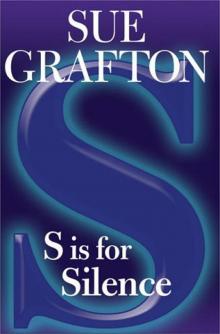 S Is for Silence
S Is for Silence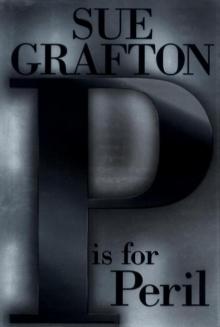 P Is for Peril
P Is for Peril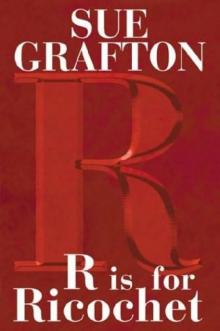 R Is for Ricochet
R Is for Ricochet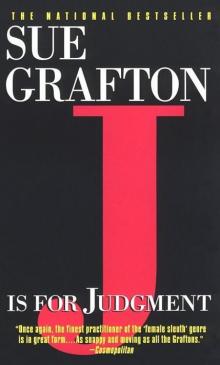 J Is for Judgment
J Is for Judgment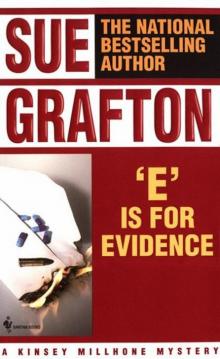 E Is for Evidence
E Is for Evidence T Is for Trespass
T Is for Trespass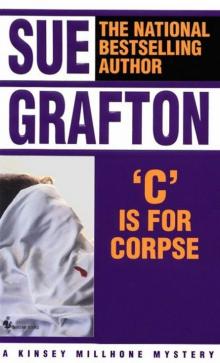 C Is for Corpse
C Is for Corpse U Is for Undertow
U Is for Undertow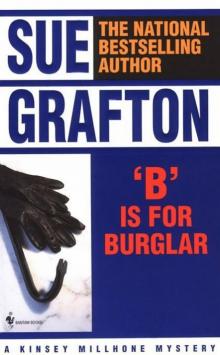 B Is for Burglar
B Is for Burglar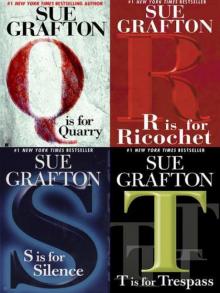 Four Sue Grafton Novels
Four Sue Grafton Novels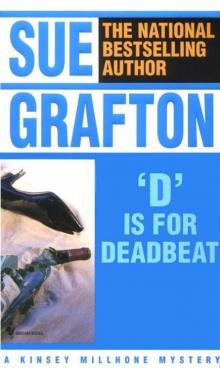 D Is for Deadbeat
D Is for Deadbeat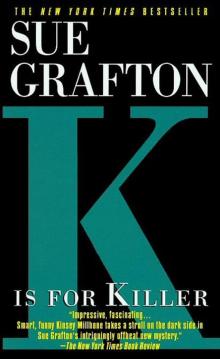 K Is for Killer
K Is for Killer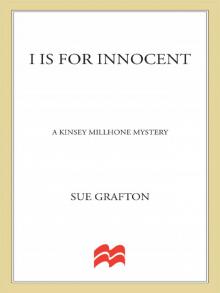 I Is for Innocent
I Is for Innocent A Is for Alibi
A Is for Alibi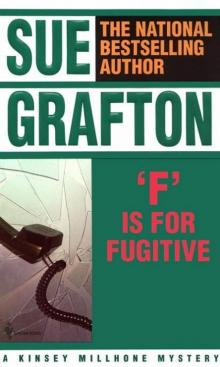 F Is for Fugitive
F Is for Fugitive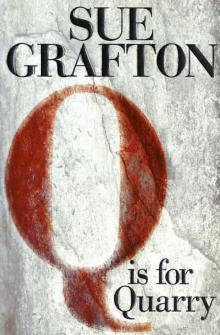 Q Is for Quarry
Q Is for Quarry W Is for Wasted
W Is for Wasted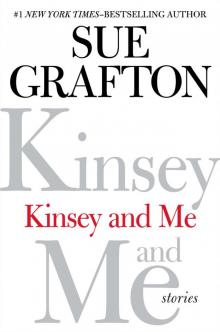 Kinsey and Me: Stories
Kinsey and Me: Stories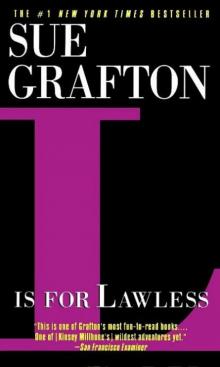 L Is for Lawless
L Is for Lawless Y Is for Yesterday
Y Is for Yesterday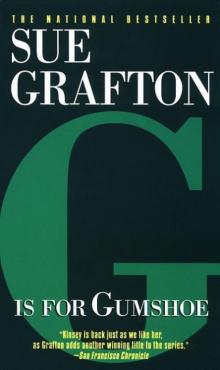 G Is for Gumshoe
G Is for Gumshoe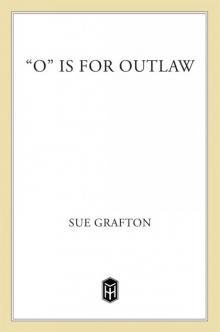 O Is for Outlaw
O Is for Outlaw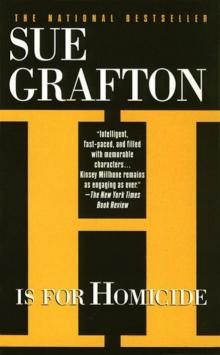 H Is for Homicide
H Is for Homicide X
X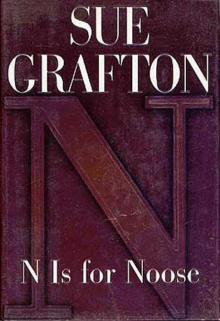 N Is for Noose
N Is for Noose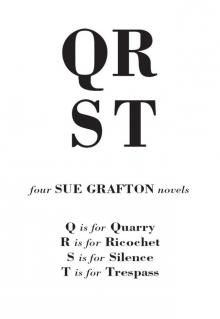 Three Complete Novels: A Is for Alibi / B Is for Burglar / C Is for Corpse
Three Complete Novels: A Is for Alibi / B Is for Burglar / C Is for Corpse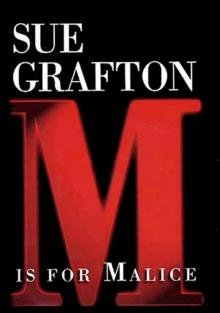 M Is for Malice
M Is for Malice I is for INNOCENT
I is for INNOCENT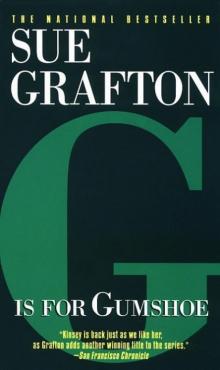 G is for GUMSHOE
G is for GUMSHOE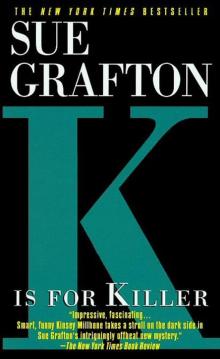 K is for KILLER
K is for KILLER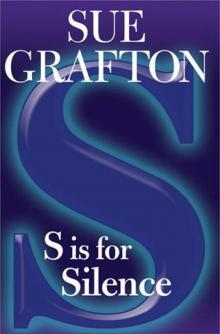 S is for SILENCE
S is for SILENCE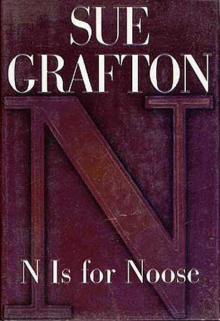 N is for NOOSE
N is for NOOSE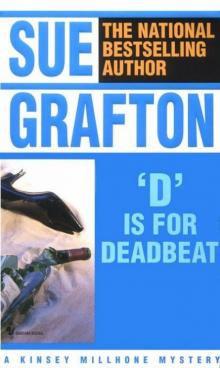 D is for DEADBEAT
D is for DEADBEAT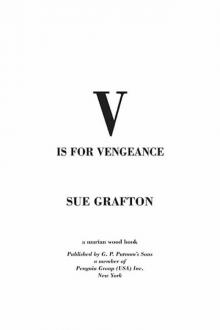 V is for Vengeance
V is for Vengeance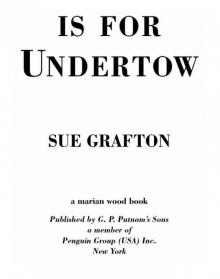 U is for Undertow
U is for Undertow W Is for Wasted km-23
W Is for Wasted km-23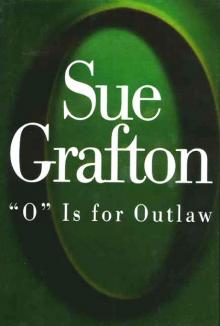 O is for OUTLAW
O is for OUTLAW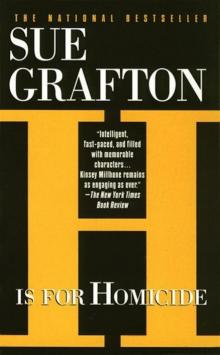 H is for HOMICIDE
H is for HOMICIDE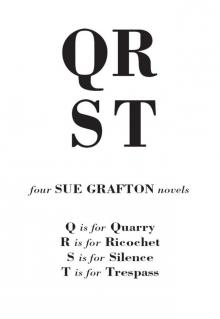 Sue Grafton Novel Collection
Sue Grafton Novel Collection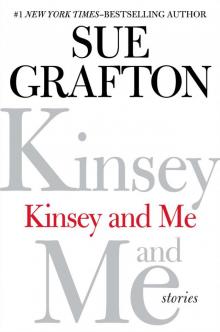 Kinsey and Me
Kinsey and Me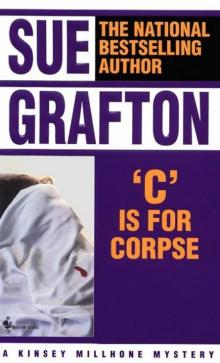 C is for CORPSE
C is for CORPSE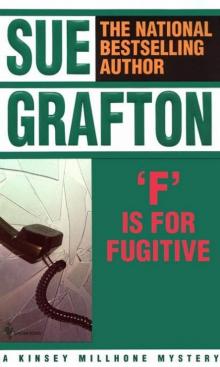 F is for FUGITIVE
F is for FUGITIVE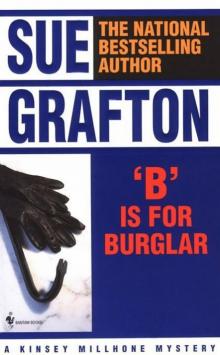 B is for BURGLAR
B is for BURGLAR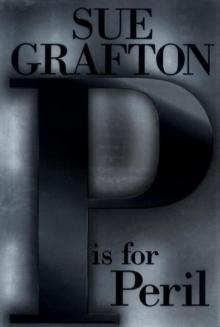 P is for PERIL
P is for PERIL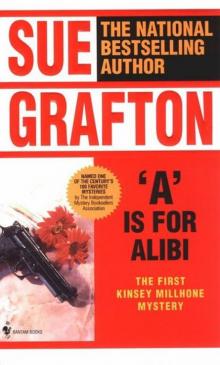 A is for ALIBI
A is for ALIBI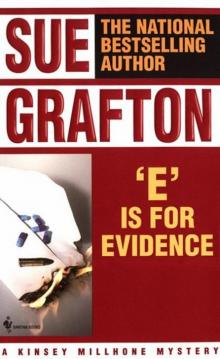 E is for EVIDENCE
E is for EVIDENCE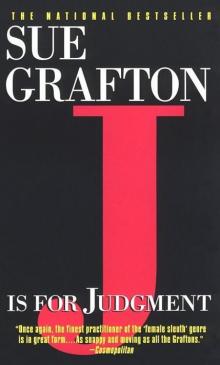 J is for JUDGMENT
J is for JUDGMENT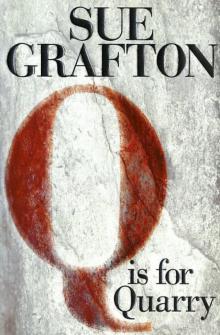 Q is for QUARRY
Q is for QUARRY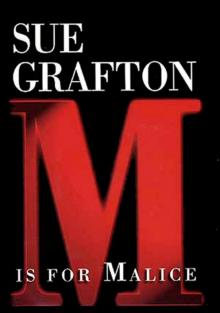 M is for MALICE
M is for MALICE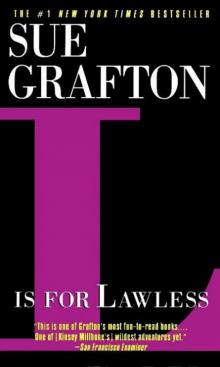 L is for LAWLESS
L is for LAWLESS